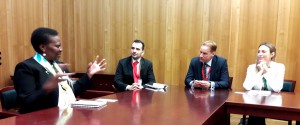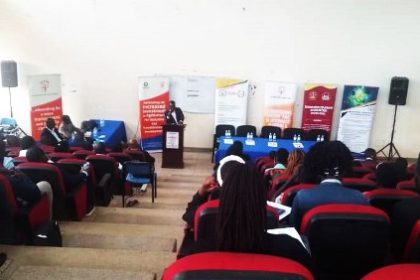Uganda has 20 independent power producers

Eng. Muloni held a series of meetings with top officials of German agencies promoting renewable energy.
April 24, 2018—Uganda has 20 independent power producers generating about 70% of the country’s electricity supply with current total production at just under 900MW including renewable sources such as solar. Scheduled to come online within 18 month are the 183MW Isimba and 600MW Karuma hydro-electric dams.
The Minister for Energy and Mineral Development, Eng. Irene Muloni was recently briefing participants at the Fourth Berlin Energy Transition Dialogue that took place at the Federal Foreign Office in the German capital.
She said Uganda had largely overcome the supply side and was now setting up a number of industrial parks to ensure that there is a sustainable market for this energy, but is not taking into account that demand is growing at 10 pc per year, and could once again outstrip supply. She said the government had also endorsed a free connection policy for all those near existing networks.
Uganda’s delegation included Marcel R. Tibaleka, Uganda’s Ambassador to Germany, Eng. Abdon Atwine, Commissioner, Electric Power Department, Minister of Energy and Mineral Development and Fred Moses Mukhooli, Counsellor at the Uganda Embassy, Berlin.
The Berlin Energy Transition Dialogue was hosted by the Federal Government together with the German Renewable Energy Federation (BEE), the German Solar Industry Association (BSW-Solar), the consultancy firm Eclareon and the German Energy Agency (dena).
Eng. Muloni invited potential German investors to consider Uganda’s well-regulated and highly liberalized economy. She also held meetings with BEE officials and representatives of Eclareon to discuss ways of tapping into Uganda’s largely unexploited and undeveloped renewable energy resources.
The event, that was opened by the new Federal Foreign Minister Heiko Maas. In attendance were ministers and high-ranking delegations from 40 countries as well as representatives from business and civil society with the aim of developing strategies for the ‘intelligent transformation’ of the energy system, the transport sector and the heating supply.
Maas assured the participants that Germany was determined to achieve the sustainable development goals and would further boost the current trend towards a global sustainable energy supply.
“The rigorous implementation of the next phase of the energy transition is a major priority for us. We are working for an international energy and climate policy. For not only are renewable energies sustainable, they are also plentiful and almost everywhere available,” he said.
He said Germany regarded the energy policy as a platform for cooperation, for dialogue and for international exchange and gave the Berlin Energy Transition Dialogue as an ideal example of this.
He pointed out that if countries failed in implementing the Paris Agreement and the 2030 Agenda for Sustainable Development, “We would find ourselves in a world which presented even greater threats to stability and peace than what we are already experiencing,” he said.
Keynote speaker, Peter Altmaier, the Federal Minister of Germany for Economic Affairs and Energy, said energy transition is a long term transition and that it had taken Germany about 30 years to have 36% of its electricity generated from renewable sources.
He said, “Wind and solar power have never been as cheaply available as they are today. The awareness of the need for a safe, economical and environmentally responsible energy supply in many countries has never before been so pronounced. Many countries in the world are radically transforming their energy supply and in so doing are placing the focus on renewable energies and improved energy efficiency. To achieve this, they often have to overcome challenges similar to those we face here in Germany and are confronted with the same issues.”
Altmaier said Germany looked forward to engaging in discussion with participants and partners on innovative business models and technologically advanced and forward-looking solutions which would accelerate the global energy transition and make it more economically and socially attractive for all.

 Shell Club rewards first winners with brand new motorbikes in Mbale
Shell Club rewards first winners with brand new motorbikes in Mbale
 CSBAG roots for increased funding for renewable energy
CSBAG roots for increased funding for renewable energy
 Equity walks tried and tested path to deliver solid half-year
Equity walks tried and tested path to deliver solid half-year
 Nile Breweries primes retailers for brave new world
Nile Breweries primes retailers for brave new world
 Uganda calls for collaboration with airlines in fight against illicit trade in wildlife
Uganda calls for collaboration with airlines in fight against illicit trade in wildlife
 Airline industry top guns dust-off passports for Uganda hosted 55th AFRAA annual meet
Airline industry top guns dust-off passports for Uganda hosted 55th AFRAA annual meet
